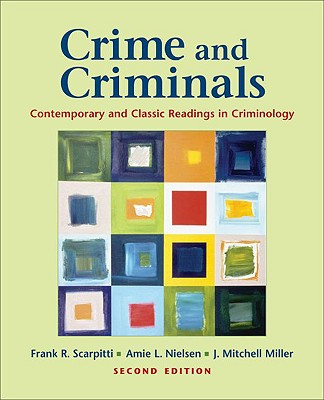图书简介
A vibrant collection of readings designed to provide a comprehensive--and accessible--introduction to criminology, Crime and Criminals: Contemporary and Classic Readings, Second Edition, brings together selections from diverse and dynamic sources, including sociologists, criminologists, and scholars from other related disciplines. Featuring twenty-four new readings, this incisive text addresses the broad range of subjects typically covered in a criminology course, including society’s attempts to control crime and criminal behavior.
Preface; Contributors; Section I. Defining Criminology and Crime; 1. Criminology as Social Science, J. Mitchell Miller; 2. Historical Explanations of Crime: From Demons to Politics, C. Ronald Huff; 3. Characteristics of the Criminal Law, Edwin Sutherland and Donald Cressey; 4. The State, the Law, and the Definition of Behavior as Criminal or Delinquent, William J. Chambliss; Section II. Observing and Measuring the Nature and Extent of Crime; 5. Are Uniform Crime Reports a Valid Indicator of the Index Crimes? An Affirmative Answer with Minor Qualifications, Walter R. Gove, Michael Hughes, and Michael Geerken; 6. Reassessing the Reliability and Validity of Self-Report Delinquency Measures, David Huizinga and Delbert S. Elliott; 7. Managing Rape: Exploratory Research on the Behavior of Rape Statistics, Gary F. Jensen and Maryaltani Karpos; 8. A Snowball’s Chance in Hell: Doing Fieldwork with Active Residential Burglars, Richard Wright, Scott H. Decker, Allison K. Redfern, andDietrich L. Smith; 9. Covert Participant Observation: Reconsidering the Least Used Method, J. Mitchell Miller; Section III. Correlates of Crime; 10. Specifying the SES/Delinquency Relationship, Charles R. Tittle and Robert F. Meier; 11. Age and the Patterning of Crime, Darrell J. Steffensmeier and Jeffery Ulmer; 12. Explaining the Gender Gap in Delinquency: Peer Influence and Moral Evaluations of Behavior, Daniel P. Mears, Matthew Ploeger, and Mark Warr; 13. Intelligence and Criminal Behavior, Scott Menard; 14. Family Relationships, Juvenile Delinquency, and Adult Criminality, Joan McCord; 15. On Immigration and Crime, Ramiro Martinez, Jr. and Matthew T. Lee; Section IV. Theories of Crime; 16. Formal and Informal Sanctions: A Comparison of Deterrent Effects, Linda S. Anderson, Theodore G. Chiricos, and Gordon P. Waldo; 17. The Criminal Man, Cesare Lombroso; 18. Does the Body Tell? Biological Characteristics and Criminal Disposition, David Row; 19. Personality and Crime: Are Some People Crime Prone?, Avshalom Caspi, Terrie E. Moffitt, Phil A. Silva, Magda Stouthamer-Moeber, Robert F. Krueger, and Pamela S. Schmutte; 20. A Sociological Theory of Criminal Behavior, Edwin H. Sutherland; 21. A Social Learning Theory of Crime, Ronald L. Akers; 22. Lower-Class Culture as a Generating Milieu of Gang Delinquency, Walter B. Miller; 23. Code of the Streets, Elijah Anderson; 24. Formal Characteristics of Delinquency Areas, Clifford R. Shaw and Henry McKay; 25. Routine Activity Theory, Lawrence E. Cohen and Marcus Felson; 26. A Control Theory of Delinquency, Travis Hirschi; 27. The Nature of Criminality: Low Self-Control, Michael Gottfredson and Travis Hirschi; 28. Foundation for a General Theory of Crime, Robert Agnew; 29. Crime and the American Dream, Steven S. Messner and Richard Rosenfeld; 30. Causes of Crime: A Radical View, Michael J. Lynch and W. Byron Groves; Section V. Criminological Observations of Crime; 31. Violent Crime in the United States, Albert J. Reiss, Jr. and Jeffrey A. Roth; 32. The Motivation to Commit Property Crimes, Kenneth D. Tunnell; 33. Organized Crime, Frank R. Scarpitti; 34. Casinos and Banking: Organized Crime in the Bahamas, Alan A. Block and Frank R. Scarpitti; 35. Denying the Guilty Mind: Accounting for Involvement in White-Collar Crime, Michael L. Benson; 36. Trouble in the Schoolyard: A Study of Risk Factors of Victimization, Christopher J. Schreck, J. Mitchell Miller, Chris L. Gibson; 37. Researching Dealers and Smugglers, Patricia A. Adler; Section VI. Responses to Crime; 38. Police, Carl B. Klockars; 39. Racial Profiling, David A. Harris; 40. The Decision to Prosecute, George F. Cole; 41. Prostitution Control in America, Ronald Weitzer; 42. The Evidence in Favor of Prisons, Richard A. Wright; 43. Decriminalization, Samuel Walker
Trade Policy 买家须知
- 关于产品:
- ● 正版保障:本网站隶属于中国国际图书贸易集团公司,确保所有图书都是100%正版。
- ● 环保纸张:进口图书大多使用的都是环保轻型张,颜色偏黄,重量比较轻。
- ● 毛边版:即书翻页的地方,故意做成了参差不齐的样子,一般为精装版,更具收藏价值。
关于退换货:- 由于预订产品的特殊性,采购订单正式发订后,买方不得无故取消全部或部分产品的订购。
- 由于进口图书的特殊性,发生以下情况的,请直接拒收货物,由快递返回:
- ● 外包装破损/发错货/少发货/图书外观破损/图书配件不全(例如:光盘等)
并请在工作日通过电话400-008-1110联系我们。
- 签收后,如发生以下情况,请在签收后的5个工作日内联系客服办理退换货:
- ● 缺页/错页/错印/脱线
关于发货时间:- 一般情况下:
- ●【现货】 下单后48小时内由北京(库房)发出快递。
- ●【预订】【预售】下单后国外发货,到货时间预计5-8周左右,店铺默认中通快递,如需顺丰快递邮费到付。
- ● 需要开具发票的客户,发货时间可能在上述基础上再延后1-2个工作日(紧急发票需求,请联系010-68433105/3213);
- ● 如遇其他特殊原因,对发货时间有影响的,我们会第一时间在网站公告,敬请留意。
关于到货时间:- 由于进口图书入境入库后,都是委托第三方快递发货,所以我们只能保证在规定时间内发出,但无法为您保证确切的到货时间。
- ● 主要城市一般2-4天
- ● 偏远地区一般4-7天
关于接听咨询电话的时间:- 010-68433105/3213正常接听咨询电话的时间为:周一至周五上午8:30~下午5:00,周六、日及法定节假日休息,将无法接听来电,敬请谅解。
- 其它时间您也可以通过邮件联系我们:customer@readgo.cn,工作日会优先处理。
关于快递:- ● 已付款订单:主要由中通、宅急送负责派送,订单进度查询请拨打010-68433105/3213。
本书暂无推荐
本书暂无推荐












